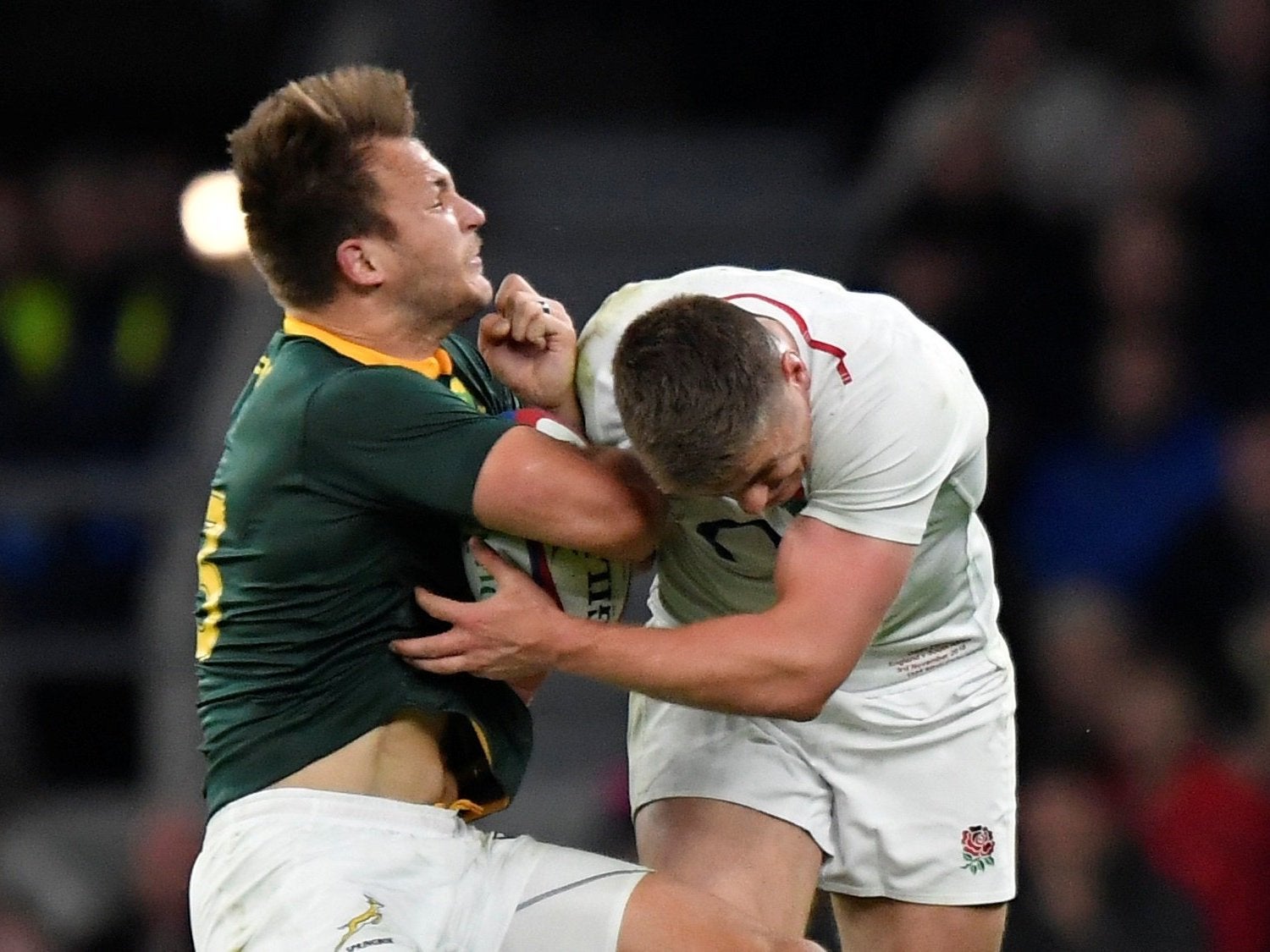Rugby World Cup: Owen Farrell has adjusted his tackle technique following high-tackle controversies
England defence coach John Mitchell reveals the risk of red cards in Japan is too great for the team’s captain not to react to last autumn’s highly-criticised tackles on Andre Esterhuizen and Izack Rodda
England defence coach John Mitchell has admitted that captain Owen Farrell has been forced to adjust his tackling technique in fear of a flurry of red cards at this year’s Rugby World Cup.
Farrell was at the centre of two controversial tackles last autumn after appearing to lead with the shoulder on South Africa centre Andre Esterhuizen and Australia lock Izack Rodda, only for neither one to be reprimanded during or after the match.
The former was subsequently used by World Rugby as the very first visual aid in their video explaining the high-tackle sanction framework which used his tackle on Esterhuizen as an example of a shoulder charge.
Yet with Tonga in line as England’s first opponents at the Rugby World Cup, a fiery contest in Sapporo is almost certain to be on the cards, and Mitchell said that given the uncertainty over red cards for tackles and clearouts involving contact with the head, the England captain has had to adjust how he tackles opponents.
“He’s not overly focused on that area but he has made some adjustments,” Mitchell said. “John Carrington, our strength and conditioning coach, is also my support on defence and he is very good at working on tackle technique. They have made some adjustments based on [what happened last November].
“There can be mitigating circumstances, but if your hands are in front of your shoulder, you’ve got a better chance of making a proper wrap tackle. If your shoulder is ahead of your hands, then the law doesn’t allow for you very well.”
The fear pre-tournament is that a number of pool matches could be decided by red cards, which would have a subsequent impact on which teams progress to the knockout stages of the World Cup. The recent World Rugby Under-20s Championship saw four red cards and 13 yellow cards blight the competition, with a decision taken not to implement the same high-tackle trial that was experimented with during that tournament for the World Cup.
But World Rugby chief Alain Rolland still visited every team in the lead up to Japan 2019 to talk over how high tackles and contact with the head will be officiated in order to try and bring some clarity to the regulations.
England head coach Eddie Jones was one of the most outspoken voices in the wake of New Zealand lock Scott Barrett’s red card during the Rugby Championship, which came when he made contact with his shoulder on the head of Wallabies captain Michael Hooper. Jones described the decision as “ridiculous” and called on World Rugby to start using common sense when making judgements on players attempting to clearout rucks as the second man, and Mitchell believes those comments have been listened to.
“We’re starting to see the panels or groups use a little more common sense around the occurrence,” added Mitchell, “so I guess that’s all you’re after because with a lot of the situations actually the intent is not illegal, but sometimes the speed or ability from height alone is quite challenging.
“I think it’s an extension of what they already had because there was a lot more focus previously on just the tackler, but now you’ve got the second man where there can be mitigating circumstances with him as well.

“At the back of everyone’s mind, if you go back to the U20s World Championship there was a lot of cards issued there. There is some apprehension around that, it’s probably not something that has been talked about but you are just going to have to deal with whatever happens. There will definitely be some apprehension around, ‘OK, is it actually going to be like that?’. You’d like to think that since then there has been learning, a little bit more common sense and you do hear the words ‘mitigating circumstances’ because when that adjudication or sanction comes, it then goes to another process to see how dangerous it was.”
That said, England will still come up against a Tongan side whose reputation precedes them. The three Pacific Island sides are among the most physically testing teams in the World Cup, though previously that has at times seen their discipline let them down as individuals tend to go ‘headhunting’ in the hope of battering opponents into submission.

Mitchell believes that could be a bigger weakness at this World Cup than before given the punishments that will now come with tactics if they are mistimed, with much more scrutiny put on high tackles and dangerous clearouts thanks to the powers of the television match official.
“The sides that haven’t spent time on that height and that tackle technique and have left it to remain liberal, that could become costly,” Mitchell added. “It’s certainly an important part about our process and we make sure that we train it in the way that it’ll give us an advantage, but ultimately at the end of the day we understand the head is a no-go zone.”
Join our commenting forum
Join thought-provoking conversations, follow other Independent readers and see their replies
Comments
Bookmark popover
Removed from bookmarks